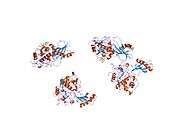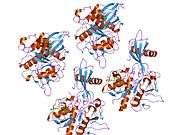Cathepsin H
| View/Edit Human | View/Edit Mouse |
Cathepsin H is a protein that in humans is encoded by the CTSH gene.[4][5]
The protein encoded by this gene is a lysosomal cysteine proteinase important in the overall degradation of lysosomal proteins. It is composed of a dimer of disulfide-linked heavy and light chains, both produced from a single protein precursor. The encoded protein, which belongs to the peptidase C1 protein family, can act both as an aminopeptidase and as an endopeptidase. Increased expression of this gene has been correlated with malignant progression of prostate tumors. Two transcript variants encoding different isoforms have been found for this gene.[5]
References
- ↑ "Diseases that are genetically associated with CTSH view/edit references on wikidata".
- ↑ "Human PubMed Reference:".
- ↑ "Mouse PubMed Reference:".
- ↑ Fuchs R, Machleidt W, Gassen HG (Feb 1989). "Molecular cloning and sequencing of a cDNA coding for mature human kidney cathepsin H". Biol Chem Hoppe Seyler. 369 (6): 469–75. doi:10.1515/bchm3.1988.369.1.469. PMID 2849458.
- 1 2 "Entrez Gene: CTSH cathepsin H".
Further reading
- Sawicki G, Warwas M (1990). "Cathepsin H from human placenta.". Acta Biochim. Pol. 36 (3-4): 343–51. PMID 2486008.
- Fuchs R, Gassen HG (1990). "Nucleotide sequence of human preprocathepsin H, a lysosomal cysteine proteinase.". Nucleic Acids Res. 17 (22): 9471. doi:10.1093/nar/17.22.9471. PMC 335148
 . PMID 2587265.
. PMID 2587265. - Chernaia VI, Reva AD (1990). "[Cathepsin H activity in the human brain and human brain neoplasms]". Ukr. Biokhim. Zh. 61 (5): 47–50. PMID 2588347.
- Ritonja A, Popović T, Kotnik M, et al. (1988). "Amino acid sequences of the human kidney cathepsins H and L.". FEBS Lett. 228 (2): 341–5. doi:10.1016/0014-5793(88)80028-0. PMID 3342889.
- Järvinen M, Rinne A (1983). "Human spleen cysteineproteinase inhibitor. Purification, fractionation into isoelectric variants and some properties of the variants.". Biochim. Biophys. Acta. 708 (2): 210–7. doi:10.1016/0167-4838(82)90222-9. PMID 6184075.
- Kato S, Sekine S, Oh SW, et al. (1995). "Construction of a human full-length cDNA bank.". Gene. 150 (2): 243–50. doi:10.1016/0378-1119(94)90433-2. PMID 7821789.
- Baumgrass R, Williamson MK, Price PA (1997). "Identification of peptide fragments generated by digestion of bovine and human osteocalcin with the lysosomal proteinases cathepsin B, D, L, H, and S.". J. Bone Miner. Res. 12 (3): 447–55. doi:10.1359/jbmr.1997.12.3.447. PMID 9076588.
- Söderström M, Salminen H, Glumoff V, et al. (1999). "Cathepsin expression during skeletal development.". Biochim. Biophys. Acta. 1446 (1-2): 35–46. doi:10.1016/S0167-4781(99)00068-8. PMID 10395917.
- Jokimaa V, Oksjoki S, Kujari H, et al. (2001). "Expression patterns of cathepsins B, H, K, L and S in the human endometrium.". Mol. Hum. Reprod. 7 (1): 73–8. doi:10.1093/molehr/7.1.73. PMID 11134363.
- Uusitalo H, Hiltunen A, Söderström M, et al. (2001). "Expression of cathepsins B, H, K, L, and S and matrix metalloproteinases 9 and 13 during chondrocyte hypertrophy and endochondral ossification in mouse fracture callus.". Calcif. Tissue Int. 67 (5): 382–90. doi:10.1007/s002230001152. PMID 11136537.
- Pol E, Björk I (2001). "Role of the single cysteine residue, Cys 3, of human and bovine cystatin B (stefin B) in the inhibition of cysteine proteinases.". Protein Sci. 10 (9): 1729–38. doi:10.1110/ps.11901. PMC 2253190
 . PMID 11514663.
. PMID 11514663. - Waghray A, Keppler D, Sloane BF, et al. (2002). "Analysis of a truncated form of cathepsin H in human prostate tumor cells.". J. Biol. Chem. 277 (13): 11533–8. doi:10.1074/jbc.M109557200. PMID 11796715.
- Brasch F, Ten Brinke A, Johnen G, et al. (2002). "Involvement of cathepsin H in the processing of the hydrophobic surfactant-associated protein C in type II pneumocytes.". Am. J. Respir. Cell Mol. Biol. 26 (6): 659–70. doi:10.1165/ajrcmb.26.6.4744. PMID 12034564.
- Bühling F, Waldburg N, Krüger S, et al. (2003). "Expression of cathepsins B, H, K, L, and S during human fetal lung development.". Dev. Dyn. 225 (1): 14–21. doi:10.1002/dvdy.10134. PMID 12203716.
- Strausberg RL, Feingold EA, Grouse LH, et al. (2003). "Generation and initial analysis of more than 15,000 full-length human and mouse cDNA sequences.". Proc. Natl. Acad. Sci. U.S.A. 99 (26): 16899–903. doi:10.1073/pnas.242603899. PMC 139241
 . PMID 12477932.
. PMID 12477932. - Jenko S, Dolenc I, Guncar G, et al. (2003). "Crystal structure of Stefin A in complex with cathepsin H: N-terminal residues of inhibitors can adapt to the active sites of endo- and exopeptidases.". J. Mol. Biol. 326 (3): 875–85. doi:10.1016/S0022-2836(02)01432-8. PMID 12581647.
- Nagai A, Terashima M, Harada T, et al. (2003). "Cathepsin B and H activities and cystatin C concentrations in cerebrospinal fluid from patients with leptomeningeal metastasis.". Clin. Chim. Acta. 329 (1-2): 53–60. doi:10.1016/S0009-8981(03)00023-8. PMID 12589965.
- Han SR, Momeni A, Strach K, et al. (2004). "Enzymatically modified LDL induces cathepsin H in human monocytes: potential relevance in early atherogenesis.". Arterioscler. Thromb. Vasc. Biol. 23 (4): 661–7. doi:10.1161/01.ATV.0000063614.21233.BF. PMID 12615673.
- Dodt J, Reichwein J (2004). "Human cathepsin H: deletion of the mini-chain switches substrate specificity from aminopeptidase to endopeptidase.". Biol. Chem. 384 (9): 1327–32. doi:10.1515/BC.2003.149. PMID 14515996.
External links
This article is issued from Wikipedia - version of the 5/22/2016. The text is available under the Creative Commons Attribution/Share Alike but additional terms may apply for the media files.




